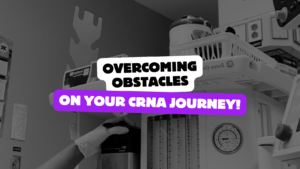If you have received the news you are invited to a CRNA school interview, it can feel exciting. But on one hand, you can’t believe you are this close to being called a Student Registered Nurse Anesthetist (SRNA) and terrified you will not be prepared for the BIG day.
I’ll never forget one of my first interviews for CRNA school. It was a panel interview and I must admit I bombed it. For one I had a huge fear of public speaking and didn’t do well in this setting. And of course, this was one of my concerns going into the interview. I also didn’t do any mock interviews prior to the interview. Basically, I wasn’t prepared.
You don’t want to get all the way to this stage in the admissions process to realize you are not as prepared as you could be. And if you are new to the interviewing process, it can be hard to know exactly where to start.
Let’s look at these 5 important tips all candidates should know to have a successful CRNA school interview.
1. Know what programs look for in the interview
Simply put, the admissions committee is looking to see if you are a good fit for their program. So their questioning is geared towards seeking this information and also getting to know the real you. They are also looking to see:
- If you are prepared for the rigors of the program. Do you know what you are getting into?
- If you are in it for more than just the lucrative salary.
- Where your passion for the profession comes from
- And also looking to see if what is on paper matches what they see in person.
Having a solid understanding of what they look for gives you a leg up during the interview phase and gives you the confidence to get through it.
2. Start preparing early
Unless you are psychic, you have no way to predict what your interview will be like. But that doesn’t mean you can’t come in ready to ace your interview. As the saying goes, before anything else, preparation is the key to success. This is so true and I can’t stress this enough. This is one of the reasons this module is part of CRNA Chase Academy because this is an area you don’t want to wait till the last minute preparing for. Getting accepted into a CRNA program requires copious amounts of prep work in order to have a pleasant and killer interview experience. Here are some ways you can prepare:
- Research the CRNA program’s requirements, mission, and interview style
- Seek out alumni or current students to get a sense of the program and what life is like for current SRNAs where you are applying
- Do mock interviews and practice talking about yourself because most nurses don’t care for bragging on themselves. The goal is to simulate the real things as often as you can.
- Ask friends, colleagues, doctors, research supervisors, professors, or anyone else you trust to help you do a mock interview. Try to simulate the real thing as well as you can.
3. Practice answering interview questions
Prior to interviewing you should create a list of common interview questions. You can find these questions by doing a web search. This will get you used to questions being thrown your way and also give you that needed boost of confidence. While there is no such thing as practice makes perfect as the saying goes, but you will never get better without it. And being ready will put you at ease and allow you to answer those questions with confidence.
4. Dress properly
After all your hard work and preparation, you surely don’t want to decrease your chances of acceptance into a CRNA program based on your dress code. The key is to keep it simple, don’t overdo it. And in my book simple means to look professional but feel comfortable.
Women: Black, gray, and navy-blue suits always work best. You can wear a suit blazer with either dress pants or a skirt. The skirt should not be too short; Your nail polish should be a neutral color. You should cover up tattoos and wear light makeup if you choose to wear any. Accessories are fine but avoid anything distracting for your jewelry.
Men: When choosing a suit, men should opt for one professional and void of loud colors or patterns. For example, a black, grey, or navy blue suit. Be sure your shoes match. Cover up any tattoos. Simple, non-flashy accessories is fine. Again, the key word is to keep it simple.
5. Make a great 1st impression
In a CRNA school interview, a great first impression may be the deciding factor in your acceptance. And unfortunately, people will judge you quickly before you even say hi. So that decision could be made as soon as you stand up when your name is called. Research shows you are sized up and an opinion is made about you in about 7 seconds. Here are some ways to get off on a great start:
- Be early. You are likely tired of hearing “If you’re early, you’re on time; if you’re on time, you’re late.” But being on time for your CRNA school is a must- especially since you’ve worked so hard to get to this point. So, no matter how many times you’ve heard it, I want you to be 20-30 minutes EARLY at least.
- Firm handshake. A firm handshake shows you are professional and confident in yourself and your abilities.
- Maintain good posture. You want to project powerful body language. This suggests confidence and also decreases self-doubt or negative thoughts.
- Make eye contact. Basically, your eyes tell a lot about you- whether you are interested in the conversation, honest, and have good manners. The best way to approach this is to pretend you are talking to an old friend.
- Remember to smile. Since smiling is part of a normal conversation, it may seem like you are disinterested if you didn’t smile. Smiling is one of the greatest body language signals, but it can easily be misinterpreted. So don’t overdo it or smile at inappropriate times. You start your interview smiling and ask how the interviewer is doing. You want to get across you are excited to talk about your background and passion for being a CRNA.
Bottom Line
The CRNA school interview is one of the most important parts of the admission process. Remember the main focus of the interview is to see what does not show on your CV or personal statement, basically see past your academic accolades and abilities. And no matter how qualified you are as a critical care nurse, a poor interview automatically reduces your chance of receiving an acceptance letter.
While the interview can be the most nerve-wracking part of the CRNA school admission process, with proper preparation and these essential tips the interview will be more exciting than overwhelming. And before long you will be part of the next cohort of admitted students. CRNA is in your hands. So by all means, you want to be as prepared as possible.
P.S. Join CRNA Chase Academy to begin prepping for your BIG upcoming CRNA school interview.







